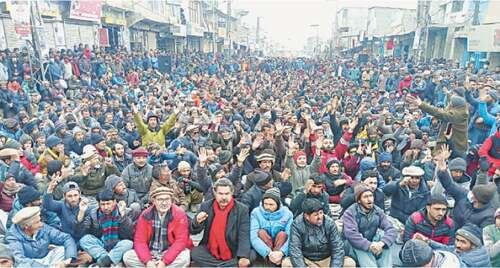EVERY November, the people of Gilgit-Baltistan commemorate their freedom and accession to Pakistan. The Pakistani state actively promotes the region as the most beautiful part of the country, highlighting its unique and breathtaking landscape to encourage tourism.
However, when a student from Gilgit-Baltistan questions the denial of constitutional rights and the territory’s undefined legal status in conversation with the prime minister, the PM simply responds with the assertion that Gilgit-Baltistan is an integral part of Pakistan and will continue to be so.
A harsh reality emerges when the issue of this region’s representation in parliament is brought before the Supreme Court of Pakistan. The federal government challenges the court’s jurisdiction, asserting that the region is not part of Pakistan but a disputed territory of Kashmir under de facto control of Pakistan. Adding to the complexity, national political parties have extended their influence in this area through local chapters and dominated the limited empowerment granted to locally elected governments.
Despite possessing substantial mineral resources and the potential for hydropower energy, the region suffers from energy deprivation due to this imposed control. The development of infrastructure is solely focused on meeting the strategic needs of the federation. A top-heavy governance structure consumes most of its limited budget grants, exacerbating the neglect.
Amidst the prevailing gloom and adversity, the resilience of the people of Gilgit-Baltistan is a silver lining. They continue to exhibit a unique ability to confront the harshest forces of nature and endure punishing winters with their limited resources. GB’s diaspora communities not only thrive outside the region but consistently return, highlighting their unwavering bond with their homeland.
The remarkable resilience of Gilgit-Baltistan’s people finds support in the NGO sector.
The remarkable resilience of these people, despite the denial of essential resources, finds support in the NGO sector. Over the past four decades, the Rural Support Programme initiated by the Aga Khan Foundation has emerged as a success story.
This visionary initiative, conceived and implemented by Shoaib Sultan, a forward-thinking civil servant, has not only flourished in the GB region but has been replicated nationwide, earning international acclaim and adoption in other countries.
Additionally, the Marafie family-funded NGO has played a pivotal role in the development of education, particularly for girls, and healthcare services, predominantly in the Baltistan division. Its impact has now expanded to encompass the entire region. The Marafie Foundation’s success is attributed to the active participation of the local community village and women groups organised by the Agha Khan Foundation, signifying a collaborative effort in promoting education and healthcare in the region.
The community’s notable achievements, facilitated by the support of these two NGOs, have served as a catalyst for the emergence of numerous NGOs initiated by the locals and comprised mostly of well-informed, educated youth.
This trend ensures sustained grassroots development of community projects, promising macroeconomic development for the region despite years of governmental neglect. This same spirit propels GB to explore innovative avenues for poverty alleviation.
Under social pressure from vocal and assertive local community organisations, GB has now embarked on a new and novel scheme for social protection for the vulnerable segments of society and the community at large.
In collaboration with Unicef Pakistan, the government of Gilgit-Baltistan has formulated a forward-thinking and comprehensive Social Protection Policy, whose most interesting aspect is that it expands the frontiers of social protection by pioneering a novel approach. It has adapted the Initial Public Offering (IPO) framework to create a Social Protection Fund (SPF).
As we well know, the concept of an IPO comes from the corporate world, where companies invite the public to buy equity shares in their future profits. However, through its novel approach, the GB government is proposing investments in human capital, social resilience, and the very fabric of our society, which may one day be found relevant to the whole of Pakistan.
The SPF is designed to address the systemic challenges of poverty and inequality in GB by providing a sustainable financial base for social protection programmes. The GB government agreed to seed this initiative with Rs100 million, demonstrating a strong commitment to social protection. Since this idea was germinated through an interactive process with Unicef, it may also consider contributing to the SPF as a pilot. SPF will eventually be linked with a provincial Social Registry.
The SPF IPO is an open invitation to every citizen, business, philanthropist, and international development partner to take a stake in the future of this region’s social welfare. Why is this important?
The SPF will stabilise social welfare funding, protecting it from political shifts and economic downturns. It will ensure that essential services — from childcare to education and emergency support — will always be available to those in need. Moreover, it will empower communities by providing the means for sustainable development, breaking the cycle of poverty and dependence.
But the SPF will do more than just provide services; it will engender a new philosophy of social welfare that is participatory, inclusive, and democratic. By buying into the SPF, investors are not just providing funds; they are taking ownership of the mission to protect and empower the most vulnerable members of society.
The SPF aims to leverage the spirit of public ownership to create a fund that is accountable to its stakeholders — the people. This is a call to action for all who share a commitment to social justice and equity.
This call to action resonates with the ethos of social justice and equity. It is an appeal to every individual and organisation that aligns with these values to join hands in this pivotal movement.
The SPF is not just a fund; it is a commitment to the idea that every individual deserves the opportunity to thrive — and that through collective investment, we can make this vision a reality for GB.
The writer, a former IGP Sindh, belongs to Gilgit-Baltistan.
Published in Dawn, January 12th, 2024















































Dear visitor, the comments section is undergoing an overhaul and will return soon.